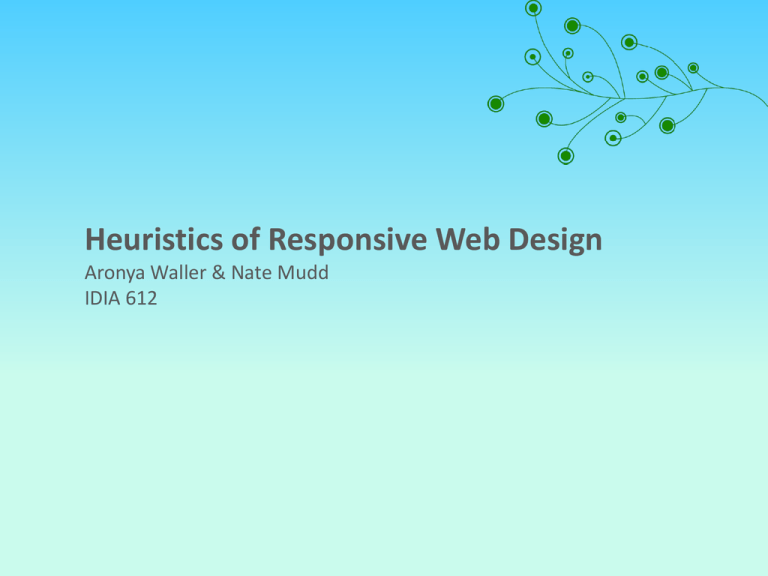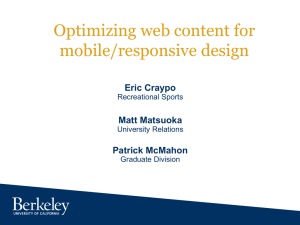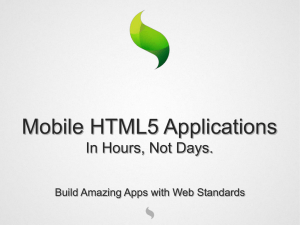Heuristics of Responsive Design
advertisement

Heuristics of Responsive Web Design
Aronya Waller & Nate Mudd
IDIA 612
Responsive Web Design is the approach
that suggests that design and development
should respond to the user’s behavior and
environment based on screen size,
platform, and orientation.
Source: http://sender11.typepad.com/sender11/2008/04/mobile-screen-s.html/
Heuristics of
Responsive Web Design
1. Flexible Everything
2. Design for Mobile First
3. Design for Progressive Enhancement
&/or Graceful Degradation
4. Optimize Content Rather Than Support
Flexible Everything
• Fluid or Liquid Layouts
• Proportionally Scaled Images
• Media Queries
Flexible Everything –
Flexible Layout
• Use percents and ems
• Don’t use finite values like pixels
• How do you convert? It’s easy:
.figure {width: 20.833%; /* 200px / 960px */ }
.headerText {font-size: 0.75em; /* 12px / 16px */ }
Flexible Everything Proportionally Scaled
Images
• Hiding and Revealing Portions of Images
• Deliver different images depending on device
• Foreground Images That Scale With the Layout
Flexible Everything Proportionally Scaled Images
Source: http://www.alistapart.com/d/responsive-web-design/ex/ex-site-flexible.html
Flexible Everything Proportionally Scaled Images
Flexible Everything –
Media Queries
• They’ve been around since CSS 2.1
• You’ve already used them
<link rel="stylesheet" type="text/css" href=“screen.css" media="screen" />
<link rel="stylesheet" type="text/css" href="print.css" media="print" />
• When CSS3 came out the W3C extended media queries
Flexible Everything –
Media Queries
@media screen and (max-width: 420px) {
.figure{
margin-right: 3.317535545023696682%;
width: 48.341232227488151658%;
}
Design for Mobile First
• Multiple screen sizes & densities
• Performance optimization
• Device capabilities
Design for Mobile First
• Consider Screen Size
• Know your users
• Focus on core actions
• Use scalable design
Design for Mobile First
Netbooks: 9" diagonal display, screen resolution of 1024 x 600 pixels, pixel
density approximately 133 ppi
iPhone: 3.6" diagonal display, screen resolution of 320 x 480 pixels, pixel
density of 160 ppi
Nokia E60: 2.2" diagonal display, screen resolution of 416 x352 pixels, pixel
density of over 240 ppi
Source: http://mobiforge.com/designing/story/effective-design-multiple-screen-sizes
Design for Mobile First
• Focus on core actions
• Know your users
• Use scalable design
Design for Mobile First
Source: http://mobiforge.com/designing/story/effective-design-multiple-screen-sizes
Design for Progressive
Enhancement
Progressive enhancement is an approach to web
development that aims to deliver the best possible
experience to the widest possible audience
Design for Progressive Enhancement
& Graceful Degradation
• basic content should be accessible to all browsers
• basic functionality should be accessible to all browsers
• sparse, semantic markup contains all content
• enhanced layout is provided by externally linked CSS
• enhanced behavior is provided by unobtrusive, externally linked JavaScript
• end user browser preferences are respected
Design for Progressive Enhancement
& Graceful Degradation
Source: http://bradfrostweb.com/blog/web/mobile-first-responsive-web-design/
Optimize Content
Rather Than Support
• Structure Content First
• Optimize for Context
• Responsive Images Test Page
http://filamentgroup.com/examples/respon
sive-images/
• Sencha.io Src
http://www.sencha.com/products/io/
• Support vs. Optimize
Examples of Responsive
Designs
Good Responsive Experience
http://unstoppablerobotninja.com/
Good Responsive Experience
http://yiibu.com/
Bad Responsive Experience
http://ubalt.edu/
Examples of Responsive
Designs
Good Responsive Experience
Source: http://colly.com/
Examples of Responsive
Designs
Good Responsive Experience
Source: http://clearairchallenge.com/
Examples of Responsive
Designs
Good Responsive Experience
Source: http://calebacuity.us/
Exercise
1. Go to the following websites:
1. ubalt.edu
2. medicare.gov
3. att.com
2. Determine three core tasks a user would want to
achieve when visiting the website from their mobile
device
3. Resize your browser to 320 x 480 (approximate)
4. How could the layout be optimized for this screen
size?
Questions?
References
BRYANRIEGER. (2009, January). Effective design for multiple screen sizes. [Blog post]. Retrieved from
http://mobiforge.com/designing/story/effective-design-multiple-screen-sizes
CalebAcuity Americas. (2011). Why us? [Website]. Retrieved from http://calebacuity.us/
Clean Air Works. (n.d.) Clean air commute challenge. [Website]. Retrieved from http://clearairchallenge.com/
Collison, S. (2011). The celebrated miscellany of Mr. Simon Collison. [Website]. Retrieved from http://colly.com/
Frost, B. (2011, June 19). Mobile-first responsive web design. [Blog post]. Retrieved from
http://bradfrostweb.com/blog/web/mobile-first-responsive-web-design/
Hjerde, M. (2008, April 15). Mobile screen size trends. [Blog post]. Retrieved from
http://sender11.typepad.com/sender11/2008/04/mobile-screen-s.html
Keith, J. (2011, March 27). Context. [Blog post]. Retrieved from http://adactio.com/journal/4443/
Knight, K. (2011, January 12). Responsive Web Design: What It Is and How To Use It. [Blog post]. Retrieved from
http://coding.smashingmagazine.com/2011/01/12/guidelines-for-responsive-web-design/
Olsson, T. (2007, February 6). Graceful degradation & progressive enhancement. [Blog post]. Retrieved from
http://accessites.org/site/2007/02/graceful-degradation-progressive-enhancement/
Sencha Inc. (2011). Sencha.io. [Computer software]. Retrieved from http://www.sencha.com/products/io/
Wroblewski, L. (2010, November 1). Mobile first. [Blog post]. Retrieved from
http://www.lukew.com/presos/preso.asp?26








